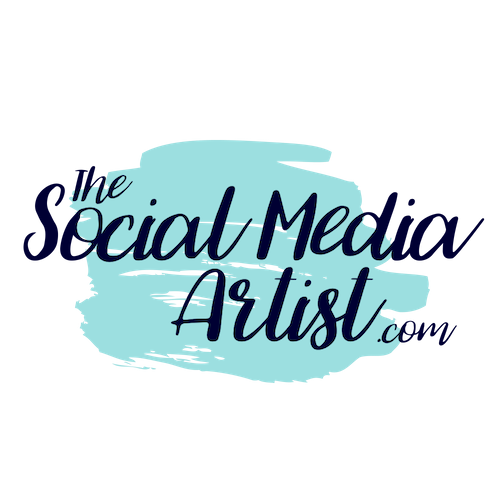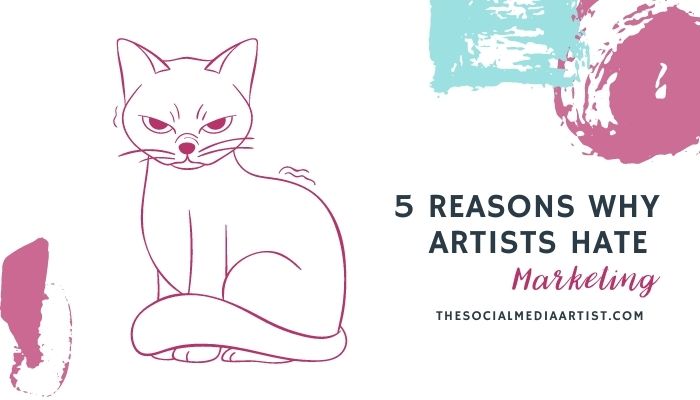Most artists we speak to can’t stand marketing their work. Is this you? Do you hate posting on Facebook and Twitter, talking about your work in detail – to the extent that you even call yourself an anti-marketer? If you think about marketing as the act of selling something or advertising your product or service for promotional purposes, of course it will make you cringe! You put countless hours into your work, and you want to show it off to the world, but how? The following are five reasons why artists hate marketing their art and what you can do about it.
“I’m not a sales person”
This is a common misconception. You are not selling your art, you’re simply sharing and promoting it. The difference between selling and sharing is often in the mindset of the artist.
The best way to change your mindset about marketing is by reminding yourself that it’s not about you as an artist or what you have to say; it’s all about the audience receiving something from you that will aid them in their journey toward making art or becoming more creative themselves.
There are many examples of artists who hated marketing their work at first but eventually saw its value, including Pablo Picasso, who said: “I do not seek, I find.”
“It’s just so awkward”
Artists don’t like to talk about themselves. It feels awkward for them to do so, and they don’t want to be seen as greedy or unappreciative of their work. The irony is that by not marketing their art, artists are actually being unappreciative of it.
The solution? Make marketing your art part of your creative process. Promote your latest piece in a blog post on an artist website, or tweet out pictures from the studio when you’re working on something new! If you can’t bear the thought of talking about yourself, ask someone else close to you (like a friend or partner) if they’d be willing to help out with social media posts and other forms of promotion so that marketing doesn’t feel like such a chore for you.
“I just want to make art and not think about it after that!”
When you’re trying to create art, you’re in a very vulnerable state. You need space and time to focus on your creative process without distraction. You want to put everything into the work itself and not be pulled away by things like marketing or sales.
Artists often feel overwhelmed by “the business” aspect of their work—it can be difficult for them to figure out how best to promote themselves and their art, especially if they haven’t been trained on these skills yet (which many haven’t). This is one reason why many artists choose self-publishing: they enjoy the freedom it provides them with when it comes down to promoting their books independently rather than handing this responsibility over exclusively to a publisher or agent who may or may not have any knowledge about how best promote an author’s book online today.
For some creators, this feeling of being overwhelmed by “the business” goes beyond just creating content—and extends into other areas like making sure there are systems in place so that someone else could take over if something happened unexpectedly during production or distribution processes that could leave everyone involved at risk financially if something went wrong!
“I don’t want to be pushy or aggressive.”
This is a common fear of artists. They don’t want to be pushy or aggressive, because they don’t want to seem like they’re just trying to make a sale. But being authentic is important in marketing your art and yourself as an artist, so it’s important that you find the right balance between being pushy and aggressive, and being personable. You need to be able to sell your art without sounding like you’re just selling “the product.” Instead, focus on who you are as an artist and how your work reflects that identity.
An artist’s identity is important and being an artist is usually not compatible with being an aggressive salesperson.
When you’re an artist, your identity is important. You need to be able to separate yourself from your art so that you can make the most of it. Artists are not salespeople; they have something more important to offer than just a few minutes of entertainment for someone who isn’t interested in it. Your art should speak for itself and have a message that resonates with whoever sees it—it shouldn’t feel like a generic advertisement trying to get someone’s attention (if only because the person who made it would probably be offended by that).
Being an artist does not mean being an aggressive salesperson who forces their work on people indiscriminately, but many artists think they do because they see themselves as having something valuable or meaningful enough that other people should want to buy into it or learn more about it. This perception makes them want to share their work with everyone they meet—and while this may seem like a good idea at first glance, if you’re always pushing yourself on others without taking time away from creating new works or engaging with those who already appreciate what you create, then there’s no room left over for growth or community building!
Want to learn more? Check out this amazing guide by Porch titled “How to Build Your Online Presence as an Artist”.

